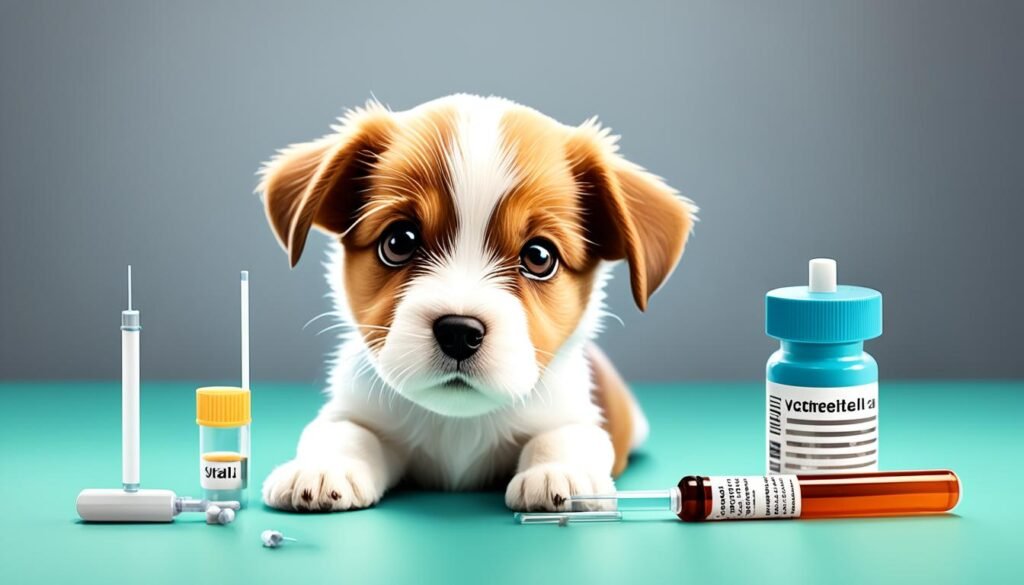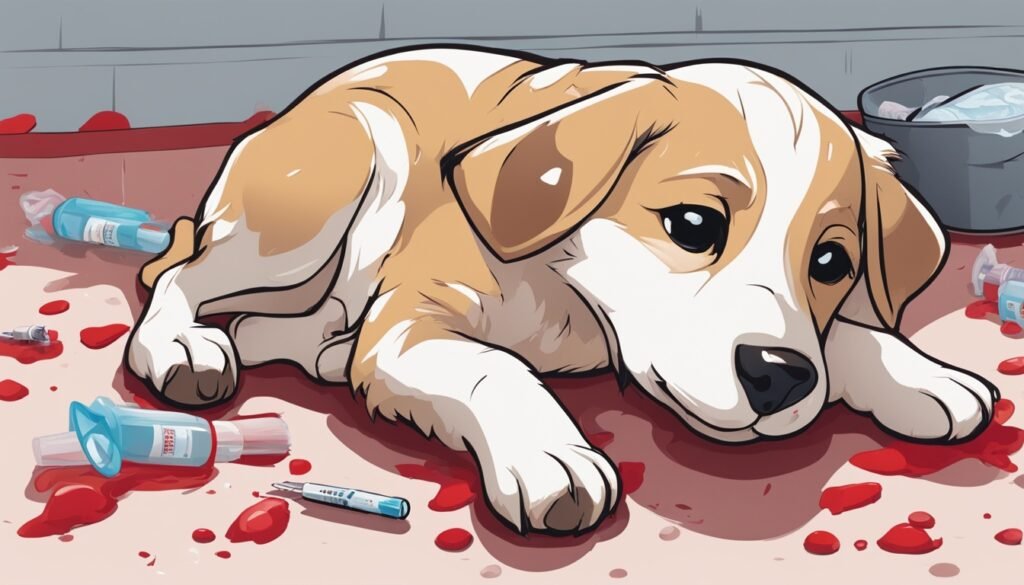In some places, a rabies vaccine isn’t required. But this virus still takes 59,000 lives yearly. It’s vital to protect your puppy with vaccinations. These shots are key in keeping them safe from serious diseases. When you get a new puppy, ensuring they get their puppy shots is your duty.
Puppy vaccines guard against risky and deadly conditions. These include bordetella bronchiseptica (kennel cough), canine distemper, and parvovirus. Symptoms of these illnesses range from coughing to paralysis. Without vaccinations, these diseases can even be fatal.
Key Takeaways
- Puppy vaccinations safeguard against life-threatening diseases like distemper, parvovirus, and rabies.
- Core vaccines like DHPP and rabies are crucial, while non-core shots target lifestyle risks.
- Puppies need a series of vaccinations starting at 6-8 weeks old until around 16 weeks.
- Rabies vaccination is legally required in the U.S. to prevent this fatal viral disease.
- Vaccination costs vary but provide immense health benefits and savings compared to treating illnesses.
Importance of Vaccinating Puppies
Vaccinating puppies is crucial for their health. It ensures they are protected from many diseases. This step is vital to keep puppies safe and healthy, especially when they are young.
Protecting Against Dangerous Diseases
Core vaccines are key. They guard against diseases like distemper, parvovirus, and rabies. These can harm a puppy’s respiratory, gastrointestinal, and nervous systems. Vaccines prevent issues like pneumonia, vomiting, diarrhea, and even death.
Ensuring a Healthy Start to Life
Besides core vaccines, there are non-core vaccines. They protect against kennel cough, leptospirosis, and Lyme disease. By sticking to the dog vaccine schedule, pet owners ensure their puppies start life healthy. They reduce the chance of getting preventable illnesses.
Choosing non-core vaccines depends on a puppy’s risk and lifestyle. It’s a smart way to take preventive care seriously.
Vaccinations within the last century have prevented death and disease in millions of animals, and understanding dog vaccinations and schedules is crucial for responsible pet ownership.
Prioritizing vaccinations helps keep puppies and other dogs safe. It stops the spread of diseases in the dog community.
Core Puppy Vaccinations
It’s key to protect puppies from serious diseases. Core vaccinations are essential for their safety. They guard against distemper, parvovirus, and rabies. These are dangerous illnesses that need quick action.
Distemper Virus
Distemper is a serious viral disease that harms a puppy’s systems. It spreads easily and can be deadly. The distemper vaccine is very important. Signs of it include eye and nose discharges, fever, and coughing. It can lead to death if not treated.
Parvovirus
Parvovirus is an awful infection. It can quickly harm and kill puppies. It leads to serious vomiting and diarrhea. The parvovirus vaccine is a must. It saves many lives.
Rabies Virus
Rabies is a deadly virus. It attacks the brain and is often deadly. It comes from animal bites. The rabies vaccine is needed quickly and required by law in the U.S. This shows how important it is.
| Vaccine | Purpose | Cost (Approximate) |
|---|---|---|
| DHPP (Distemper, Hepatitis, Parvovirus, Parainfluenza) | Core vaccine protecting against multiple diseases | $25 per shot |
| Rabies | Prevents fatal rabies virus | $15-20 per dose |
Giving puppies their core vaccines protects them from severe illnesses. This includes distemper, parvovirus, and rabies. These diseases can be very harmful but are avoidable through vaccination.
Non-Core Puppy Vaccinations
Core vaccinations are crucial for all puppies. Yet, additional non-core vaccines might be needed. Your vet might suggest them, focusing on your puppy’s lifestyle and risk factors. These shots offer extra protection against certain diseases. It helps if your puppy faces a higher risk from its environment or activities.
Bordetella Bronchiseptica (Kennel Cough)
The bordetella vaccine stops kennel cough. It’s caused by a contagious bacteria. Puppies who go to doggy daycare or boarding, or join group classes need this. Without it, kennel cough causes a bad and dangerous cough, sometimes leading to pneumonia.

Leptospirosis
Leptospirosis is spread through water in puddles and ponds. It can badly harm a puppy’s kidneys and liver. The vaccine is important, especially in areas where the disease is common. If your puppy likes the outdoors, their vet will likely recommend it to keep them safe. It is key to know about dog vaccinations and schedules for your puppy’s well-being.
Lyme Disease
In places with many ticks, your puppy might need the Lyme disease vaccine. This disease can cause serious joint and kidney issues. Puppies in the northeast and midwest areas of the U.S. should get this immunization. It helps avoid Lyme disease.
Vaccines may cause slight discomfort or tiredness. But, the chance of severe diseases is much higher without them. Working with your vet, you can come up with a program that fits your puppy’s needs. Together, you ensure your furry friend stays healthy and happy.
Puppy Vaccination Schedule
Getting your puppy the right shots is key to their health. A series of puppy shots start as early as 6-8 weeks. This process, known as the dog vaccine schedule, helps them fight off serious diseases.
The first shot is the DHPP vaccine. It guards against distemper, adenovirus (hepatitis), parainfluenza, and parvovirus. At 6-8 weeks old, your puppy gets this shot. They then need boosters at 10-12 weeks and 16-18 weeks.
Another key vaccine is for rabies. It’s given at 16-18 weeks old, or as the law says. This shot keeps your puppy safe from a deadly virus.
Based on your puppy’s life and where they go, your vet might suggest more vaccines. These could be for Bordetella (kennel cough), Leptospirosis, or Lyme disease.
After the first series of shots, your puppy needs boosters. How often depends on the vaccine. Your vet will make sure your puppy’s dog vaccine schedule fits their specific needs.
| Age | Recommended Vaccinations |
|---|---|
| 6 – 8 weeks | Distemper, Parvovirus |
| 10 – 12 weeks | DHPP (Distemper, Adenovirus, Parainfluenza, Parvovirus) |
| 16 – 18 weeks | DHPP, Rabies |
| 12 – 16 months | DHPP, Rabies (boosters) |
| Based on lifestyle | Bordetella, Leptospirosis, Lyme disease, Influenza, Coronavirus |
Sticking to the puppy vaccination schedule keeps your pet safe. It’s the best way to protect them from diseases and ensure they start off healthy.
Adult Dog Vaccination Schedule
Keeping up with your dog’s vaccinations and schedule is vital for their well-being. After the first set of shots, adult dogs still need regular check-ins for their vaccine schedule. They should get a mix of core and non-core vaccines that fit their health needs.
The main vaccines are DHPP and rabies. DHPP fights four diseases, and rabies is a must by law. Dogs may need DHPP every year or every three years. Rabies shots depend on the law and can be every one to three years.
Other vaccines like bordetella and leptospirosis might be suggested based on where you live and your dog’s life. Lifestyle vaccines are often yearly or every six months.
If your dog misses a dose, the vet might give extra shots until they’re safe again.
At every check-up, the vet reviews your dog’s vaccine needs. They look at age, health, where you live, how much you travel, and the local diseases. Talking with the vet helps keep your adult dog vaccine schedule in the best shape.
| Vaccine | Frequency |
|---|---|
| Rabies | Every 1-3 years (per legal requirements) |
| DHPP (Distemper, Hepatitis, Parvovirus, Parainfluenza) | Annually or every 3 years |
| Leptospirosis | Annually |
| Bordetella (Kennel Cough) | Annually |
| Canine Influenza | Annually |
| Lyme Disease | Annually |
Vaccination Side Effects and Safety
Sometimes, dogs may have mild reactions to vaccines. These can include a bit of soreness where the shot was given, feeling tired, or a slight fever. But, serious side effects from canine immunizations are almost unheard of. This is because vaccines go through a lot of testing to make sure they are safe and work well.
Not getting your dog vaccinated means they could get very sick from diseases. Diseases like distemper, parvovirus, and rabies can be life-threatening. The small chance of a mild side effect from a vaccine is way less risky than getting these dangerous illnesses.
If your vet gives the vaccines the right way, you don’t need to worry. Modern dog vaccinations and schedules are very safe. They help protect your dog from getting sick. Being up-to-date on vaccines is a big part of keeping your furry friend healthy.

Vaccination has prevented death and disease in millions of animals over the last century, and continues to be one of the most effective means of safeguarding pet health.
Every medical procedure, even vaccines, has a tiny chance of causing a side effect. But the risk of these issues is very low compared to the dangers of the diseases. Being a good pet owner means knowing about these risks and making smart choices with your vet.
- Common, mild side effects after vaccination may include tenderness at the injection site, swelling, tiredness, mild fever, or decreased appetite.
- In cases of intranasal vaccines, sneezing or coughing may occur as the body mounts an immune response.
- It is crucial to monitor pets closely for any signs of allergic reactions post-vaccination, seeking immediate veterinary care if symptoms like fainting, persistent vomiting, difficulty breathing, or swelling occur.
Costs of Puppy Vaccinations
Getting your puppy vaccinated is very important for their health. Knowing the prices of puppy shots and dog vaccinations lets pet owners prepare and find ways to save money.
Average Costs
A full set of puppy vaccinations, which includes key vaccines like DHPP and the rabies vaccine, usually costs between $75 and $100. A DHPP dose might be around $25, and the rabies vaccine could be $15 to $20. If you add extra vaccines, like the bordetella vaccine for kennel cough, the cost goes up.
Vaccination prices can change depending on where you live and the type of clinic you go to.
Ways to Save on Vaccinations
There are ways to make puppy vaccinations more affordable:
- Check with local animal shelters or rescue groups for lower-cost vaccination clinics.
- Inquire about discounts or payment plans offered by different veterinary clinics.
- Consider visiting a veterinary school, where services may be more affordable.
By focusing on getting your puppy vaccinated while looking for budget-friendly choices, you can keep them safe from diseases without breaking the bank.
| Vaccine | Average Cost |
|---|---|
| DHPP (series) | $20 – $60 |
| Leptospirosis (series) | $20 – $30 |
| Rabies (one-year) | $20 – $30 |
| Bordetella | $30 – $50 |
| Canine Influenza | $45 – $65 |
| Lyme (series) | $20 – $40 |
Adult Dog Booster Vaccinations
Making sure your adult dog gets their booster shots on time is key. It keeps them safe from harmful diseases. For important core vaccines like DHPP and rabies, boosters are needed every 1-3 years. This is in line with how long they provide protection. For other vaccines, like for bordetella and Lyme disease, it’s usually needed every year or every six months. This depends on how much risk your dog faces, something your vet will help figure out.
Even if your dog stays inside, they still need booster shots. These shots help them stay protected against illnesses. It’s important to keep up with these shots to follow your vet’s advice. They will recommend what’s best for your dog.
Following a regular dog vaccine schedule is crucial for your dog’s health. It protects them all through their life.
| Vaccine | Duration of Immunity | Booster Frequency |
|---|---|---|
| DHPP | 3 years | Every 3 years |
| Rabies | 3 years | Every 3 years |
| Leptospirosis | 1 year | Annually |
| Canine Influenza | 1 year | Annually |
| Lyme Disease | 1 year | Annually |
| Bordetella (Kennel Cough) | 6 months | Semi-annually |
Keeping up with your dog’s booster shots as advised by your vet is essential. It protects them from severe illnesses. This keeps your furry friend healthy and strong always.
Lifestyle Factors and Non-Core Vaccines
Core canine immunizations protect against serious illnesses like distemper, parvovirus, and rabies for all dogs. However, some dogs need more based on their lifestyle. This includes if they often visit dog parks, board at facilities, or spend a lot of time outside.
If a dog visits a boarding kennel or plays with many other dogs, getting the bordetella vaccine is a good idea. It helps prevent kennel cough, a common problem in such places. The leptospirosis shot is important too, especially for dogs that like to swim. This vaccine protects against a bacteria carried in water.
Living in or traveling to certain areas might call for the lyme disease vaccine. This is for places with a lot of ticks. There are also vaccines for things like canine influenza and snake bites, depending on where the dog is. These can prevent diseases that are more common in specific places.
Veterinarians look at what a dog does and where it goes to decide on the best extra vaccines. This way, each dog gets the protection it needs, without getting shots that it might not need. They make a plan that works just for that dog.
Non-core vaccines depend on what a dog does and where it goes. For example, some dogs may need bordetella for kennel cough, leptospirosis for dirty water, and lyme disease for tick areas. Vets can figure this out by looking at each dog’s life and decide on the best vaccines.
Preventing Vaccine-Preventable Diseases
Understanding dog vaccinations and their schedules is key. They prevent many deadly illnesses. These include the rabies virus and distemper, among others. Core and non-core vaccines protect our pets from these illnesses.
The diseases can spread in various ways. They come from coughs, touching contaminated areas, and even via insect bites. They can cause coughs, pneumonia, and other serious conditions. Sadly, some can even lead to the loss of our beloved pets.
By following the right dog vaccination schedule, we keep our pets safe. This includes both core and chosen non-core vaccines. They protect our pets from the pains, big medical bills, and even death caused by these illnesses. Vaccines are a smart and affordable way to look after our canine friends.
| Core Vaccines | Non-Core Vaccines |
|---|---|
|
|
Experts agree that widespread use of vaccinations has prevented death and disease in millions of animals within the last century.
Choosing the Right Vaccines with Your Vet
When it comes to understanding dog vaccinations and schedules, not every dog is the same. A dog’s age, health, where it lives, lifestyle, and risk factors all matter. It’s key to talk with your vet to set the right dog vaccine schedule for your pet.
Vets can give advice based on your dog’s needs, deciding between core vs non-core vaccines. Core vaccines are a must for all, they protect against diseases like distemper and rabies. Non-core ones, for diseases such as bordetella and lepto, may be needed if your dog has specific risks.
Keeping your vet updated on your dog’s daily life and health goals helps. It ensures they get the right vaccines at the right time. This partnership creates the best dog vaccine schedule for your pet and helps prevent diseases.
Your vet will look at several points when setting your dog’s vaccine plan:
- Age: Puppies start core vaccines at 6-8 weeks and need boosters up to 16 weeks old.
- Lifestyle: Active dogs or those that board may need additional vaccines.
- Geographic location: Some areas have more disease risk, requiring extra protection.
- Health status: If your dog is not well, their vaccination plan might change.
Working closely with your vet ensures your dog gets the best protection. With a customized canine immunizations plan and dog vaccine schedule, your pet stays healthy. This partnership is crucial to ensure your dog’s shots are right for them.
Conclusion
Getting puppies vaccinated and keeping up with adult dog boosters is vital. It’s a key part of preventing health issues in pets. Core vaccines like DHPP and rabies are necessary for all dogs. Non-core ones are chosen based on lifestyle, and advice from a vet. Even though vaccinations might seem costly, they save money by avoiding sickness later on.
Side effects are uncommon and the benefits far outweigh the risks. Staying informed, following the right vaccine schedule, and talking to your vet are crucial. This ensures your dog is protected from dangerous diseases. Diseases like parvovirus and distemper can be fatal but are preventable through vaccines.
Understanding vaccines helps avoid diseases that can make pets very sick. These include issues like vomiting, diarrhea, or worse. Non-core vaccines, like for bordetella, help prevent respiratory problems. Others, for leptospirosis and Lyme disease, guard against infections from water or ticks. Working with a vet means timely vaccinations and boosters, which provide full protection.
FAQ
Why is it important to vaccinate puppies?
What are the core vaccinations for puppies?
What are non-core vaccinations for puppies?
What is the typical puppy vaccination schedule?
How often do adult dogs need booster vaccinations?
Are dog vaccinations safe?
How much do puppy vaccinations typically cost?
What lifestyle factors influence non-core vaccine needs?
What diseases do dog vaccinations protect against?
How does a vet determine the right vaccination schedule?
Source Links
- https://www.petmd.com/dog/care/dog-vaccinations-for-every-lifestage
- https://www.akc.org/expert-advice/health/puppy-shots-complete-guide/
- https://wagwalking.com/wellness/understanding-dog-vaccines-and-vaccination-schedules
- https://www.aaha.org/resources/pet-vaccination/
- https://www.avma.org/resources-tools/pet-owners/petcare/vaccinations
- https://www.goodrx.com/pet-health/dog/puppy-vaccine-schedule
- https://vcahospitals.com/know-your-pet/vaccines-for-dogs
- https://www.smalldoorvet.com/learning-center/wellness/vaccine-schedules-for-dogs-puppies/
- https://www.petmd.com/dog/general-health/possible-vaccine-reactions-in-dogs
- https://www.dailypaws.com/living-with-pets/pet-costs/dog-vaccinations-cost
- https://www.marketwatch.com/guides/pet-insurance/dog-vaccinations-cost/
- https://www.abornpethospital.com/services/dogs/dog-vaccinations
- https://www.peaksnpaws.com/blogs/dog-chews-toys/ultimate-guide-to-dog-vaccinations-schedule-and-benefits
- https://be.chewy.com/dog-vaccinations-a-complete-guide/
- https://www.ncbi.nlm.nih.gov/pmc/articles/PMC7348620/
- https://dogventurehq.com/what-is-a-comprehensive-guide-to-dog-vaccinations/
- https://supertails.com/blogs/posts/dog-puppy-vaccination-your-guide-to-dog-vaccination-schedule







